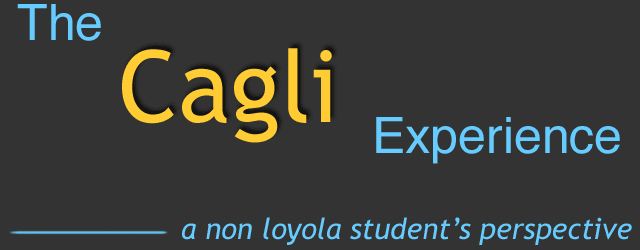
Matt Satterfield
I admit it. I don't go to Loyola. I actually go to another school in Latrobe, Pa. You're probably wondering why a student from a school in Pennslyvania, majoring in English, haven taken no communication classes, would take part in a multimedia program through another school in a foreign country without knowing any of the students or professors at all. Well, the answer is actually pretty simple and complicated at the same time.
Simple in the fact that what it all comes down to is experience. And that probably sounds cliched and you've probably heard it from anyone who has studied abroad. So what separates the Cagli experience apart from other study abroad programs?
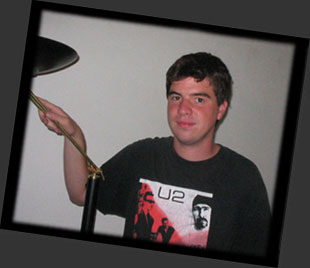
Matt Satterfield - St. Vincents College
This is where the answer gets complicated. The Calgi Program is unlike any study abroad program I have heard or read about. Whereas most study abroad programs house students in the universities, in the Calgi program, it is totally different. I was not living in a dorm room, but rather a small quaint apartment in downtown Calgi. I was forced to interact with the townsfolk, not just by ordering drinks and food, but by also doing the work for which I came here for. Each one of the students was forced to write a story on some aspect of the town - whether it be a social aspect or someone's life - through several different multimedia platforms such as web design, video documentaries, a journalistic story, and photos. Even with the help of a translator, we were all still forced to interact with the townsfolk on a personal level. Sometimes this could be a daunting task - people were not always willing to be interviewed, and I once found myself being yelled at by a few passerby's while taking some pictures for one of my projects.
On another level, the Cagli program forces team work, and time prioritizing. For instance, one person would have their story to write, and the other members of a group would be in charge on html, video, and photography - each person getting to do one job at least once. I often found that some of my group members could not get their work done, until i had done my part, so it kind of forced me to work harder. Also, with the limited number of computers and lab hours, you had to prioritize what you needed to get done.
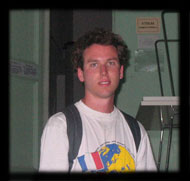
Michael Enright - Gonzaga University
Coming from an outside school, I wasn't sure what to make of the program at first. Would the professors treat me any different? Would I be able to get along with my fellow students on a work level? On a social level? These questions went racing through my head before was here. This may sound ridiculous, but because of the amount of work, and interaction I kind of had to throw myself into the program. There wasn't much time at first to really make friends or be worried about what people thought. But based on the interaction I had with my fellow students I soon found myself making friends without even really realizing it. There are only 32 students in the program, which I think works to its advantage. You get to know everyone really well - and besides realizing which person is good at making videos or writing a story - you also begin to notice the students who make you laugh, or are just the person who is there when you need them, but don't even realize it.
I was also skeptical of how the professors would react to me. But I soon found that that treated me just like anyone else. Because of the immersion of this program, the professors are available more than what they ever at home. No one is put above another. The professors are all rooting for the students to do the best job that they can, and the results have been pretty spectacular. If you ever need help, they are more than willing to come and help you figure out what you problem is.
Essentially there is a more one on one emphasis here than in other programs. Another problem I ran into, was the fact that most everyone on the program was in some sort of communications based major, and here I was with a lowly English degree. But after awhile I found that to be okay, because some people were really good with video editing, which I had no idea how to do, but I had no trouble at all with writing the stories. So there were people in the programs with many different talents all working together.
I'm probably making this all sound like there's all work and no play, to a certain degree thetas true. I don't want to lead people astray and have them think that is all going to be a joy ride to Italy and you can do whatever you want. Because its not. There's work to be done, and done is what it has to be. But there are some great social aspects as well. Trips to Rome, Florence, and Venice were provided on the weekends, which were great. But at the end of the day, everyone knows that there is work that has to be completed and finished.
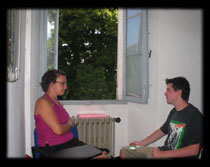
Non loyola students
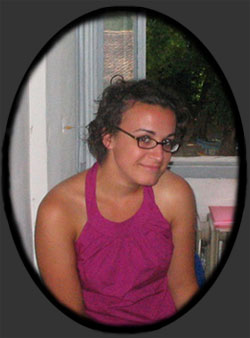
Rose Brecevich -Ithaca College
The other non Loyola students I talked to in the program pretty much agreed with my thoughts and sentiments. Rose first heard about the program through her friend, Christina who goes to Loyola. When she first saw the paperwork of what the program was like she said it "looked fun and independent, although the work looked like it would cover lots of topics." As time went on though, she said she became more comfortable with the work, and that her interactions with her groups members wasnąt as stressful as she originally thought it might be. Being from a different school is not a problem for Rose, who likes being seperate from other students on the program.
Andrew Ciofalo, head of the Cagli program ultimately wants to expand the program, and hopefully incorporate more non Loyola students into the program as well. But that may take a while, after all this is only the second year that the program has been running. Ciofalo stated that the ultimate goal of the program is "to create an ongoing activity that reflects how people work in the world these days, and to be able to have [the students] have an immersion through contact with other people, and to be able to have these wonderful experiences and be comfortable in a foreign country."
With that in mind, I think the Cagli program has succeeded. At least for me anyway. Besides all the work that I have to show for it, I am never going to forget the faculty, and friends I met while I was here. For six weeks in the summer of 2003, I became two things I would have dreamed about. I was a member of Loyola College, and also a member of the town of Cagli, Italy.
Story and photos: Matt Satterfield - Web Design and HTML: Stephanie Hossbach